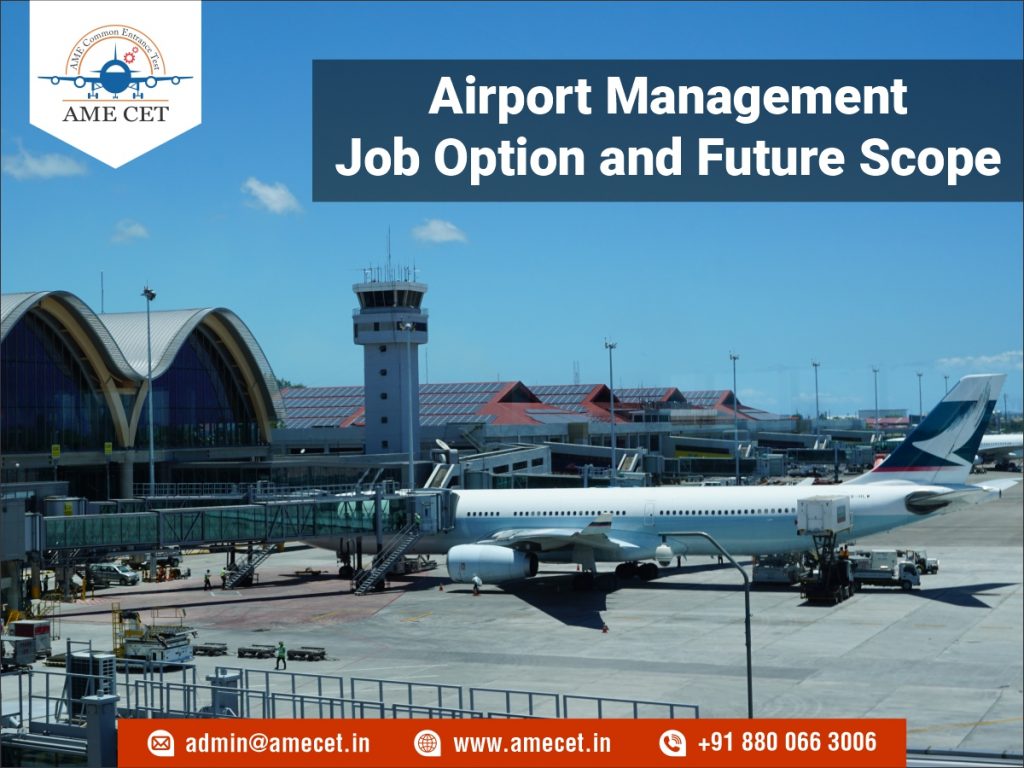Airport Management Job Option and Future Scope
Posted on : 29 March, 2023 4:46 pm
Airport management refers to the management and operation of an airport, including its facilities and services. It involves a range of activities, including managing airport infrastructure, overseeing airport security, managing airport finances, and coordinating airport operations.
Airport managers are responsible for ensuring that the airport is safe, efficient, and profitable. They work closely with various stakeholders, including airlines, government agencies, and other airport tenants, to ensure that airport operations run smoothly. Airport management also involves overseeing the maintenance and development of airport facilities, such as runways, taxiways, and terminal buildings, to ensure they are up to industry standards and can accommodate the needs of passengers and airlines.
Additionally, airport managers are responsible for developing and implementing security measures to ensure the safety and security of passengers, staff, and airport property. This may involve working closely with law enforcement agencies and implementing security protocols to prevent and respond to security threats.
Overall, airport management plays a crucial role in the smooth and efficient operation of airports, which are critical components of the global transportation infrastructure.
Eligibility to Pursue Airport Management Program
- Students from 12th with any stream from recognized university/board are eligible for the airport management programme.
- Students can qualify for AME CET 2023 to take admission in one of the top institutes in India.
Airport Management Course Detail
In Airport Management we describe two courses
-
BBA in Airport Management
BBA in Airport Management is a three-year undergraduate program that aims to provide students with the knowledge and skills required to effectively manage and operate an airport. During the course, students will learn about airport operations, airport security, air traffic management, aviation marketing, and customer service.
In addition, the course also focuses on developing soft skills such as communication, leadership, teamwork, and time management, which are essential for managing an airport. Students will also learn about personality development and how to enhance their communication skills, as airport management involves a lot of interaction with passengers and other stakeholders.
The course also emphasizes the importance of learning multiple languages, as it can help students better connect with passengers from different countries and cultures. Overall, the BBA in Airport Management is a comprehensive course that prepares students to meet the demands of the competitive aviation industry and build a successful career in airport management.
-
Certification in Airport Management
It is possible that some institutions offer a shorter duration airport management course of around 11 months. During this course, students can learn about the operation of the airport, including airport planning, air traffic management, aviation security, and ground handling.
In addition, the course can also focus on developing soft skills such as personality development, communication skills, and leadership skills, which are important for effective airport management. Students can also expect to learn from qualified experts who have practical experience in the aviation industry.
Overall, this shorter duration course can be an excellent option for those who want to quickly gain knowledge and skills in airport management and prepare themselves for a career in the aviation industry. However, it is important to carefully research and select an accredited institution offering such courses to ensure the quality of education and value of the certification.
Job Options After Airport Management Program
Here are some job options in airport management:
- Airport Manager: Responsible for overseeing and coordinating airport operations, including airside and landside operations, security, finance, and personnel management.
- Air Traffic Controller: Responsible for the safe and efficient movement of aircraft in and out of the airport’s airspace.
- Operations Manager: Responsible for managing the day-to-day operations of the airport, including airline services, ground handling, and terminal operations.
- Safety and Security Manager: Responsible for ensuring that airport facilities, employees, and passengers are safe and secure, and for developing and implementing security protocols and procedures.
- Environmental Manager: Responsible for ensuring that airport operations comply with environmental regulations, minimizing the airport’s impact on the environment, and implementing sustainability initiatives.
- Business Development Manager: Responsible for identifying and developing new business opportunities for the airport, including marketing and promotion, air service development, and tenant management.
- Customer Service Manager: Responsible for ensuring that passengers have a positive experience at the airport, overseeing passenger services, retail and food outlets, and other amenities.
- Maintenance Manager: Responsible for ensuring that airport facilities and equipment are maintained and repaired as needed, including runways, taxiways, and airport buildings.
- Procurement Manager: Responsible for managing the procurement process for the airport, including purchasing goods and services, negotiating contracts, and managing vendor relationships.
- Human Resources Manager: Responsible for managing the airport’s workforce, including hiring, training, and employee relations.
Jobs Salaries of Airport Management
The salary of airport management jobs in India can vary depending on factors such as job position, level of experience, location, and the size of the airport. However, in general, airport management jobs in India can offer competitive salaries.
Here are some estimated average salaries for different airport management positions in India:
- Airport Operations Manager: INR 700,000 – INR 1,500,000 per year
- Aviation Director: INR 1,200,000 – INR 2,500,000 per year
- Airport Manager: INR 500,000 – INR 1,200,000 per year
- Air Traffic Control Manager: INR 800,000 – INR 1,800,000 per year
- Security Director: INR 900,000 – INR 2,000,000 per year
It’s important to note that these salaries are estimates and can vary based on many factors, including the size and location of the airport, level of experience, and job responsibilities. Additionally, salaries can also vary by company and region.

